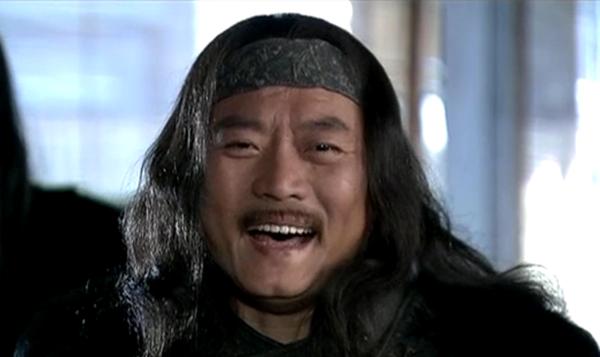(Splendid Beach original works, reproduction is strictly prohibited)
Today's Three Kingdoms idiom story is found in the 120th romance of the Three Kingdoms, which occurred during the Western Jin Dynasty's war against Wu, and the relevant characters are Shen Ying, Wang Mao, Zhang Ti, and Zhuge Liang. The original text is as follows:

Shi Longjun's general Wang Mao led his sailors down the river. The outpost said: "Wu man-made iron cables, crossed along the river, and prepared with iron cones placed in the water." "He laughed, so he built a raft in dozens of directions, tied the grass to man, put on the armor and held the staff, stood around, and put it down along the water. When Wu Bing saw it, he thought that he was a living person and looked forward to the wind and went first. Dark cone on the raft, lifted away. And on the raft made a big torch, more than ten meters long, more than ten large fences, and filled with sesame oil, but when it encountered iron cables, it burned and burned, and all the hairs were broken. Two roads come from the river. Everywhere you go, you can't win.
However, it is said that Zhang Ti, the chancellor of Eastern Wu, ordered the left general Shen Ying and the right general Zhuge Liang to come to meet the Jin soldiers. Ying said: "The upper armies are not vigilant, I expect that the Jin army will come here, and it is advisable to do our best to make the enemy." If you are lucky enough to win, Jiangnan will be at peace. Now crossing the river and fighting, unfortunately and defeated, then the big thing is gone. Liang Yue: "The public word is also." "Before the words were finished, the people reported that the Jin soldiers went down the river, and the situation was overwhelming. The two were shocked and panicked to see Zhang Ti for consultation. Liang said, "Eastern Wu is in danger, why don't you go away?" Weeping: "Wu Zhi will die, the wise and the foolish know together, and if all the kings and subjects fall now, no one will die in the national disaster, and it will not be insulted!" Zhuge Liang also wept and left. Zhang Ti and Shen Ying swung their troops to the enemy, and the Jin troops surrounded them together. Zhou Zhi first attacked the Wu camp. Zhang Ti fought hard and died in the rebellion. Shen Ying was killed by Zhou Yi. Wu Bing scattered and fled.
According to the plot development of the novel, Sima Yan, the Emperor of the Jin Dynasty, launched the Battle of Wu, and the Western Jin General Wang Mao led his troops down the river and won successive battles. Although the Eastern Wu general Zhang Ti, the left general Shen Ying, and the right general Zhuge Liang resisted to the death, they were still unable to block the Jin offensive. During the battle, Zhang Ti and Shen Ying were killed one after another. Soon after, Sun Hao surrendered and Eastern Wu fell.
The idiom to be introduced in this article is the brave momentum of the Western Jin Dynasty army, called "unstoppable", which means that the momentum is rapid and irresistible. The earliest source of this idiom is the "Jin Shu Xi Jian Biography" in which "the group is rebellious and indulgent, its momentum is unstoppable, it can be counted, and it is difficult to compete." ”
The defeat of Zhang Ti, Shen Ying, and Zhuge Liang by the Western Jin dynasty described in this article is a real historical event that took place in the first year of the Western Jin Dynasty (280 AD). According to the Chronicle of the Three Kingdoms, the Biography of the Three Heirs: "When the Emperor and the Emperor arrive, they fall apart and have a ruler." He also beheaded Wu Yan, the governor of Jiangling, Hun Fu, Zhang Ti, Danyang Taishou Shen Ying, and so on, where they were fighting. The biography quotes the Xiangyang Chronicle as describing the course of the battle in great detail: "When the Jin Dynasty came to conquer Wu, Hao made Shen Ying and Zhuge Liang, the governors of The Tang Dynasty, led 30,000 people to cross the river against it... The Wu army was defeated. Zhuge Liang and five or six hundred people retreated, making them greet each other and refusing to go... Liang Rano let go of it, went to more than a hundred steps, and was already killed by the Jin army. Although Zhang Ti, Shen Ying, and Zhuge Liang and others resisted desperately, eastern Wu, whose national strength was declining, was far from being an opponent of the Jin army, and it was not surprising that Zhang Ti and Shen Ying ended up.
As for Zhuge Liang mentioned in the novel, the family background is very special. His father's name was Zhuge Zhi, a cousin of Zhuge Liang, the chancellor of the Shu Han Dynasty, who was originally a chancellor of Cao Wei, and later launched a rebellion in Huainan and died at the hands of Sima Zhao, so Zhuge Liang also defected to Eastern Wu and later became the Great Sima of Eastern Wu. Zhuge Liang and Sima Yan, the Emperor wu of Jin, were also extraordinary. According to the "New Language of the World", Zhuge Liang and Sima Yan are "good at bamboo horns", that is, small hair. At the same time, Zhuge Liang's sister was also the wife of Sima Yan's uncle Sima Ling. It is precisely because of this special relationship that after the fall of Eastern Wu, Zhuge Liangning died unwilling to serve the Western Jin Dynasty, and Sima Yan would be extrajudicial and not prosecuted.
Reference Books: Romance of the Three Kingdoms, New Language of the World, Romance of the Three Kingdoms